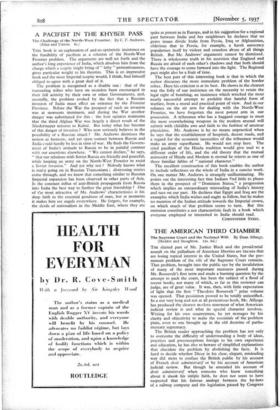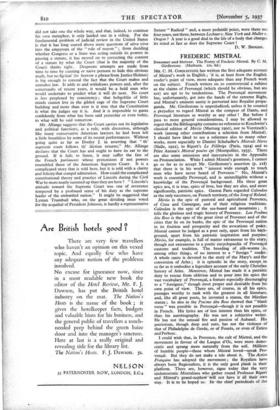THE AMERICAN THIRD CHAMBER
The Supreme Court and the National Will. By Dean Alfange. (Hodder and Stoughton. I2S. 6d.) THE shirted past of Mr. Justice Black and the presidential assault on the palladium of American liberties are themes that are losing topical interest in the United States, but the per- manent problem of the role of the Supreme Court remains. That problem, brought into the public eye by the invalidation of many of the most important measures passed, during Mr. Roosevelt's first term and made a burning question by the attempt to pack the court, has been the subject of a flood of recent books, not many of which, as far as this reviewer can judge, are of great value. It was, then, with little expectation of light that the first " Theodore Roosevelt " prize volume was opened. That pessimism proved to be totally unjustified. In a not very long and not at all pretentious book, Mr. Alfange has produced the clearest modern statement of what American judicial review is and what its special character involves. Writing for his own countrymen, he yet manages by his clarity and objectivity to make the essentials of the problem Plain, even to one brought up in the old doctrine of parlia- mentary supremacy.
The British reader approaching the problem has not only to overcome the difficulty of understanding a body of ideas, practices and preconceptions foreign to his own experience and education, he has also to beware of simplified explanations that elucidate the problem by abolishing the facts. It is hard to decide whether Dicey in his clear, elegant, misleading way did more to confuse the British public by his account of French drat administratif or by his account of American judicial review. But though he amended his account of droit administratif when someone who knew something about it shook his simple 'faith, he does not seem to have suspected that his famous analogy between the by-laws of a railway company and the legislation passed by Congress
did not take one the whole way, and that, indeed, to continue his own metaphor, it only landed one in a siding. For the fundamental problem of judicial review in the United States is that it has long soared above mere questions of ultra vires into the empyrean of the " rule of reason " ; from deciding whether Congress or a State was acting outside its powers in passing a statute, it has moved on to correcting the content of a statute by what the Court (that is the majority of the Court) thinks right.. Desperate attempts are made from time to time by cunning or naive persons to hide this obvious truth, but no fig-leaf (to borrow a phrase from Justice Holmes) is big enough to conceal the fact that the Court makes and unmakes law. It adds to and withdraws powers and, after the somersaults of recent years, it would be a bold man who would undertake to predict what it will do next. No court is less perplexed by consistency ; that hobgoblin of little minds cannot live in the gilded cage of the Supreme Court building and more than ever is it true that the Constitution is what the judges say it is. And it is impossible to guess confidently from what has been said yesterday or even today, to what will be said tomorrow.
Mr. Alfange suggests that the Court carries out its legislative and political functions, as a rule, with discretion, although like many conservative American lawyers he had been left a little breathless by some of its recent performances. Without going quite as far as Dooley J. in asserting that " th' supreem coon follows th' iliction returns," Mr. Alfange declares that the Court has and ought to have its ear to the ground. If it fails to listen, it may suffer the fate of the French pariements whose pretensions if not powers resembled those of the American Supreme Court. It is a complicated story that is told here, but it is told with a clarity and felicity that compel admiration. How could the complicated constitutional theory and practice of Lincoln during the Civil War be more neatly summed up than they are here ? " Lincoln's attitude toward the Supreme Court was one of reverence tempered by a profound sense of his duty as the supreme leader of the embattled nation." It might be suggested that Lyman Trumbull who, on the great dividing issue voted for the acquittal of President Johnson, is hardly a representative Senate " Radical " and, a more pedantic point, were there not four years, not three, between Lochner v. New York and Muller v. Oregon? A year is a good deal in the life of a body that changes its mind as fast as does the Supreme Court !
D. W. BROGAN.















































 Previous page
Previous page